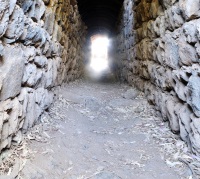
In Luke 13, someone asked Jesus, “Lord, will only a few people be saved?” Jesus replied, “Strive to enter through the narrow door, for many, I tell you, will attempt to enter but will not be strong enough.” (Luke 13:23-24) This response is similar to Matthew 7, where Jesus said, “Enter through the narrow gate; for the gate is wide and the road broad that leads to destruction, and those who enter through it are many. How narrow the gate and constricted the road that leads to life. And those who find it are few.” (Matthew 7:13-14)
What is the wide and broad road that leads to destruction? That wide and broad road would be a way of life that succumbs to sin with little or no resistance. How easy it is for the fallen human nature to commit sin and to look out only for oneself or persons that one has an attachment to. How easy it is for us to do the things that give us pleasure at the expense of others. How easy it is for us to argue God’s will and design in order to justify our own lifestyles.
What then, is this narrow door or narrow gate that Jesus spoke of? That narrow door is a way of life that closely follows Christ. If that is correctly understood, then it would be a way of life that not only avoids sin and forgoes its pleasures, but also embraces true love for God and neighbor through word and deed. That is not an easy way of life because it requires dependence and trust in God’s grace and great effort on our part. As St. Paul told the Philippians, “Work out your salvation with fear and trembling… and to do everything without grumbling or questioning, that you may be blameless and innocent, children of God without blemish in the midst of a crooked and perverse generation, among whom you shine like lights in the world.” (Philippians 2:12, 14-15)
Once again, Jesus in Luke’s Gospel warns His listeners not to waste time in living out the Gospel. He said, “After the master of the house has arisen and locked the door, then will you stand outside knocking and saying, ‘Lord, open the door for us.’ He will say to you in reply, ‘I do not know where you are from.’ And you will say, ‘We ate and drank in your company and you taught in our streets.’ Then he will say to you, ‘I do not know where [you] are from. Depart from me, all you evildoers!’” (Luke 13:25-27)
That Gospel passage from Luke is similar to Matthew 7, where Jesus said, “Not everyone who says to me, ‘Lord, Lord,’ will enter the kingdom of heaven, but only the one who does the will of my Father in heaven. Many will say to me on that day, ‘Lord, Lord, did we not prophesy in your name? Did we not drive out demons in your name? Did we not do mighty deeds in your name?’ Then I will declare to them solemnly, ‘I never knew you. Depart from me, you evildoers.’” (Matthew 7:21-23)
The more time we spend in procrastinating in living out the Gospel, the more we put our immortal souls in danger. Someone might say, “I don’t kill, I don’t commit adultery, I don’t steal. In fact, I donate my used clothes to charity once a year, so I’m ready to go to heaven.” If that is all it takes to enter the narrow door, then why did Jesus say that many who try to enter it will not be strong enough? (cf. Luke 13:24)
One of the more pervasive behaviors in society today is that more and more people put their opinions and feelings above everything else. In large part, this kind of behavior is fueled by the ease of using social media to make oneself heard on a world-wide scale. Some people who feel offended for no good reason retaliate with uncontrolled and disproportionate vengeance; they attack people just because their feelings were hurt. Others plant deep resentments in their hearts. That kind of behavior is not living out the Gospel. Together with all other kinds of bad behavior, there is an urgency to repent, to change the way we think, feel and act, because the narrow door will not remain open indefinitely (cf. Luke 13:25).